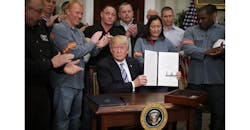Done Deal. Trump Signs Tariff Order on Metals With Wiggle Room for Allies
President Donald Trump followed through on his pledge to impose stiff tariffs on imported steel and aluminum, while excluding Canada and Mexico and leaving the door open to sparing other countries on the basis of national security.
The president signed a proclamation authorizing the tariffs at a meeting Thursday afternoon with workers from the steel and aluminum industries. The U.S. will levy a 25% duty on steel and 10% on aluminum, the same level Trump promised when he revealed the plan March 1, according to a senior administration official who briefed reporters before the signing. The tariffs will take effect in 15 days, the official said.
“Today I’m defending America’s national security by placing tariffs on foreign imports of steel and aluminum,” Trump said, flanked by workers from the industries and economic advisers who had backed the plan.
The president said U.S. political leaders preceding him had allowed the decline of manufacturing in the nation, and cited a protectionist predecessor, President William McKinley, in defense of the tariffs. “Our factories were left to rot and to rust all over the place,” Trump said.
The prospect of further exclusions should trigger a push by U.S. allies in Europe, Australia and elsewhere to lobby for similar treatment to Canada and Mexico.
The tariff threat has escalated tensions from Beijing to Brussels. On Thursday, China’s foreign minister, Wang Yi, vowed a “justified and necessary response” to any efforts to incite a trade war. It was the Chinese government’s most forceful response yet to the new tariffs.
Wang, who spoke on the sidelines of the National People’s Congress in Beijing, urged the U.S. to work with China on a mutually beneficial solution.
“A trade war has never been the right way to solve the problem, especially under globalization,” Wang said. Such a conflict “will only harm everyone and China will surely make a justified and necessary response.”
Steel Supplier
Canada, the biggest supplier of steel and aluminum to the U.S., and No. 4 steel-provider Mexico had asked to be exempted, and indicated they would have retaliated if Trump included them in the duties.
Negotiators from the U.S., Canada and Mexico wrapped up the seventh round of NAFTA talks this week in Mexico still hoping for a breakthrough on the biggest sticking points. No date has been announced yet for the next round of negotiations and it’s almost certain the parties won’t meet their goal to reach a deal by the end of March.
“If we don’t make the deal on NAFTA,” Trump said, “then we’re going to terminate NAFTA and we’re going to start all over again, or we’ll just do it another way.”
But if a deal is made, he said “there won’t be any tariffs on Canada, and there won’t be any tariffs on Mexico.”
The EU has warned it would respond with its own 25% tariff on about $3.5 billion of American goods. The bloc is targeting iconic U.S. brands produced in key Republican states on a range of consumer, agricultural and steel products, according to a list drawn up by the European Commission.
Trump’s authority to establish the tariffs stems from a Commerce Department investigation that found that imports of the metals pose a risk to national security. The probes were authorized under the seldom-used Section 232 of the 1962 Trade Expansion Act, which gives the president broad powers to impose trade restrictions on domestic security grounds.
By Andrew Mayeda and Jennifer Epstein
